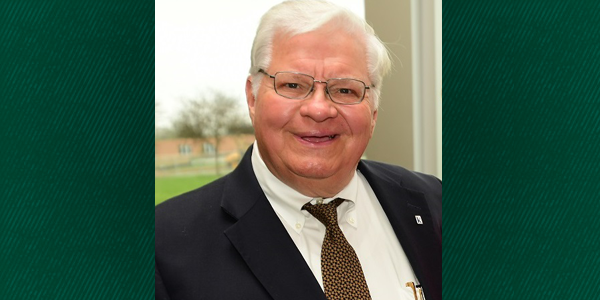
Donating part or all of your unused retirement assets such as a gift from your IRA, 401(k), 403(b), pension or other tax-deferred plan is an
excellent way to make a gift to our organization.
Consider these advantages:
- It's simple to set up.
- You're able to maintain control of your assets.
- It provides a gift to Northwest in an amount you believe is appropriate, and you can still provide for your loved ones.
- It provides an estate tax deduction.
- It provides for a cause you deem worthy at Northwest.
- It includes membership in the Northwest Foundation's James H. Lemon Heritage Society.
- Leaves a lasting legacy at Northwest
Contact the Office of University Advancement at 660.562.1248 or [email protected] to find out about the many advantages of providing an estate
provision.
After a 35-year career that took him from journalism and broadcasting to marketing and communication, Steve Carpenter is grateful for the preparation
Northwest Missouri State University provided him, and he is helping to ensure future students have the same opportunities.
Recently, Carpenter, a 1976 alumnus, decided to give back to Northwest, providing a $45,000 gift to the Northwest Foundation through a retirement annuity to
benefit the School of Communication and Mass Media.
"I feel honored and blessed to have been helped and guided and aided by so many good people at Northwest," Carpenter said. "I would be a truly ungrateful
person if I didn't do something in return. It just excites me to think of some future young people that got excited by the idea of communicating and telling
stories and sharing news. They don't even know why they want to do that, but if my forethought can help future generations, that's great."
He added, "I had so many wonderful professors. It's a very supportive atmosphere at Northwest that opened all these doors for me."
Carpenter grew up in the small towns of Harrison County, Missouri, graduating from Ridgeway High School in 1973. He credits the school superintendent for
pointing him to Northwest.
"He actually drove me over to Northwest one spring morning in '73 and introduced me," Carpenter said. "I don't know whether it was the planets aligning or
whether he did a wink and a nod, but I was visiting the Ad Building, filling out a few forms and … (then-President) Robert P. Foster walked up and
just happened to be in the office. We said hello and 'Well, I hear you're going to be at Northwest! That's great!' It was just like cue the president, here
we are."
Carpenter had become interested in broadcasting at an early age by tagging along with his aunt who worked at a daytime radio station. After it went off the
air during the evenings, she sometimes gave Carpenter the reins of the studio.
"She would take me to the radio station, give me a stack of records in the studio and I was busy for about three hours," he said. "I got hooked on radio. I
got to see a little 500-watt, daytime-only station from the inside."
So it was an easy decision for him to pursue his bachelor's degree in broadcasting and communication at Northwest. He took advantage of opportunities to
work on both the student-run KDLX and the National Public Radio affiliate, KXCV. His early days at KXCV in 1974 proved to be one of the most infamous in
American history.
"One of the first weeks I got to run the board and be on KXCV was the evening that Richard Nixon announced his resignation, August 8 of 1974," Carpenter
said. "It was one of the first times I got to earn my two bucks an hour. I remember turning the knobs and meeting the National Public Radio special report
of the resignation of President Nixon."
Carpenter also enjoyed experiences as a member of Blue Key and the Homecoming Committee at Northwest. He has fond memories, too, of a work-study he
completed with Dr. Larry Riley, a professor of psychology, sociology and counseling who was visually-impaired.
"I would read his textbooks on to reel-to-reel tapes in a little cubby office for hours, and what a wonderful opportunity," Carpenter said. "I would read
these textbooks, page after page. A few times I would tell Dr. Riley how far I'd gotten and he would say, 'Well, you were reading Noam Chomsky,
Steve. Did you have any thoughts on his theories about how language is developed?' I look back and I have to chuckle that these were some of the great minds
in linguistic thought over the years, and he's having me read them on tape."
Armed with the résumé-building experiences he earned at Northwest, as well as some weekend work at KMA in Shenandoah, Iowa, Carpenter
launched his full-time professional radio career in 1977 at KKJO in St. Joseph, Missouri, where he worked an overnight shift, from midnight to 6 a.m. and
then produced commercials until 8 in the morning. Quickly, he worked his way up to a dayshift and then mornings. He was appointed music director and finally
program director.
During that stint with KKJO, Carpenter returned to Northwest to DJ a couple dance marathons. He also was on the other end of the phone line when one of his
mentors at Northwest, Rollie Stadlman, called KKJO, asking for assistance in the hours after a fire nearly destroyed the Administration Building, which
included the KXCV studios.
"There was a handoff from pickup to pickup, and we loaned a bunch of stuff to them and they got back on the air," Carpenter said. "I have fond memories of
that picture and our KKJO DJ setup. We loaned it to them for a few weeks until they could get some other equipment and get back on to full-time business."
In the summer of 1981, WMT radio in Cedar Rapids, Iowa, hired Carpenter. While continuing regular radio shifts there, he earned his master's degree at the
University of Iowa, taking one class at a time.
In 1989, Carpenter moved to Kirkwood Community College and was the station manager of KCCK until ending his radio career in 1997. A public relations role
opened at the college, and Carpenter accepted it, remaining there until his 2012 retirement.
Today, Carpenter and his wife, Mary - they met when she was a guest on his talk show at WMT - reside in the small town of Bertram, Iowa, and escape to
southern Florida during winter months.
"Whatever steps up the ladder I've been able to make in my life, I could not have done it without education. I could not have done it without the great team
of mentors that I had," Carpenter said, crediting mentors that included Stadlman, Sharon Cross Bonnett, Cathran Cushman and Warren Stucki.
"When you go to National Public Radio conferences and they say, 'You were on the air as a sophomore?' I'd say, 'Yeah, and I sounded like a sophomore,'"
Carpenter added. "It just warms my heart to get back and visit family in north Missouri, and I turn on 90.5. I kind of home in on the signal like a beacon,
and I hear these young people who are learning, who are getting better every day, who are working their way through the broadcast stuff and the AP
Stylebook, and you can just hear that learning happening. I think the best supporters of the station understand that and say, 'This kid is going places and
who knows where we'll hear this voice in 10 years."








